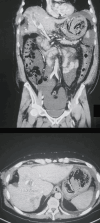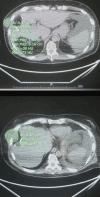Recurrent Aggressive Hepatocellular Carcinoma Presenting With Chest Wall Metastasis and Portal Vein Thrombosis: A Rare Case and a Multidisciplinary Perspective
- PMID: 40762000
- PMCID: PMC12320916
- DOI: 10.7759/cureus.87330
Recurrent Aggressive Hepatocellular Carcinoma Presenting With Chest Wall Metastasis and Portal Vein Thrombosis: A Rare Case and a Multidisciplinary Perspective
Abstract
Hepatocellular carcinoma (HCC) is a leading cause of cancer-related mortality worldwide, often presenting with aggressive intrahepatic and extrahepatic spread. Extrahepatic metastasis occurs in a significant proportion of advanced HCC cases, most commonly affecting the lungs, regional lymph nodes, bones, and adrenal glands. However, metastasis to the chest wall is exceedingly rare and infrequently reported in the literature. We report an unusual case of a 71-year-old male with chronic hepatitis C infection and a history of HCC resection in 2019, who presented with abdominal distension, lower extremity edema, and a rapidly enlarging chest wall mass. Imaging and biopsy confirmed metastatic HCC, showing trabecular architecture and positive immunohistochemical staining for HepPar-1 and glypican-3, with portal vein thrombosis (PVT) and chest wall involvement - a rare metastatic pattern. This case highlights HCC's aggressive nature, the importance of early recognition of atypical metastases, and the value of multidisciplinary management - encompassing oncology, hepatology, radiology, and pathology - in improving patient outcomes.
Keywords: chest wall metastasis; hepatitis c; hepatocellular carcinoma (hcc); portal vein tumor thrombosis; recurrence.
Copyright © 2025, Salimiaghdam et al.
Conflict of interest statement
Human subjects: Informed consent for treatment and open access publication was obtained or waived by all participants in this study. Conflicts of interest: In compliance with the ICMJE uniform disclosure form, all authors declare the following: Payment/services info: All authors have declared that no financial support was received from any organization for the submitted work. Financial relationships: All authors have declared that they have no financial relationships at present or within the previous three years with any organizations that might have an interest in the submitted work. Other relationships: All authors have declared that there are no other relationships or activities that could appear to have influenced the submitted work.
Figures
Similar articles
-
Thyroid metastasis from hepatocellular carcinoma: a rare case report and literature review.Front Oncol. 2025 Jun 12;15:1581927. doi: 10.3389/fonc.2025.1581927. eCollection 2025. Front Oncol. 2025. PMID: 40575170 Free PMC article.
-
An 88-Year-Old Woman with a 33-Year History of Idiopathic Portal Hypertension Presenting with Hepatocellular Carcinoma Treated with Carbon-Ion Radiotherapy.Am J Case Rep. 2025 Jul 18;26:e947725. doi: 10.12659/AJCR.947725. Am J Case Rep. 2025. PMID: 40676829 Free PMC article.
-
Triple reversal phenomenon in EGFR-mutant lung adenocarcinoma with prostate metastasis following hepatocellular carcinoma: a rare Case Report with diagnostic and therapeutic implications.Front Med (Lausanne). 2025 Jul 16;12:1619466. doi: 10.3389/fmed.2025.1619466. eCollection 2025. Front Med (Lausanne). 2025. PMID: 40740944 Free PMC article.
-
Orbital Metastasis as the First Manifestation of Hepatocellular Carcinoma, and Its Effective Treatment with Combined Dual Immunotherapy: A Case Report and Review of the Literature.Am J Case Rep. 2024 Jun 3;25:e944002. doi: 10.12659/AJCR.944002. Am J Case Rep. 2024. PMID: 38825807 Free PMC article. Review.
-
NIH Consensus Statement on Management of Hepatitis C: 2002.NIH Consens State Sci Statements. 2002 Jun 10-12;19(3):1-46. NIH Consens State Sci Statements. 2002. PMID: 14768714
References
-
- Global cancer statistics 2020: GLOBOCAN estimates of incidence and mortality worldwide for 36 cancers in 185 countries. Sung H, Ferlay J, Siegel RL, Laversanne M, Soerjomataram I, Jemal A, Bray F. CA Cancer J Clin. 2021;71:209–249. - PubMed
-
- Hepatocellular carcinoma. Llovet JM, Kelley RK, Villanueva A, et al. Nat Rev Dis Primers. 2021;7:6. - PubMed
-
- From NASH to HCC: current concepts and future challenges. Anstee QM, Reeves HL, Kotsiliti E, Govaere O, Heikenwalder M. Nat Rev Gastroenterol Hepatol. 2019;16:411–428. - PubMed
Publication types
LinkOut - more resources
Full Text Sources


